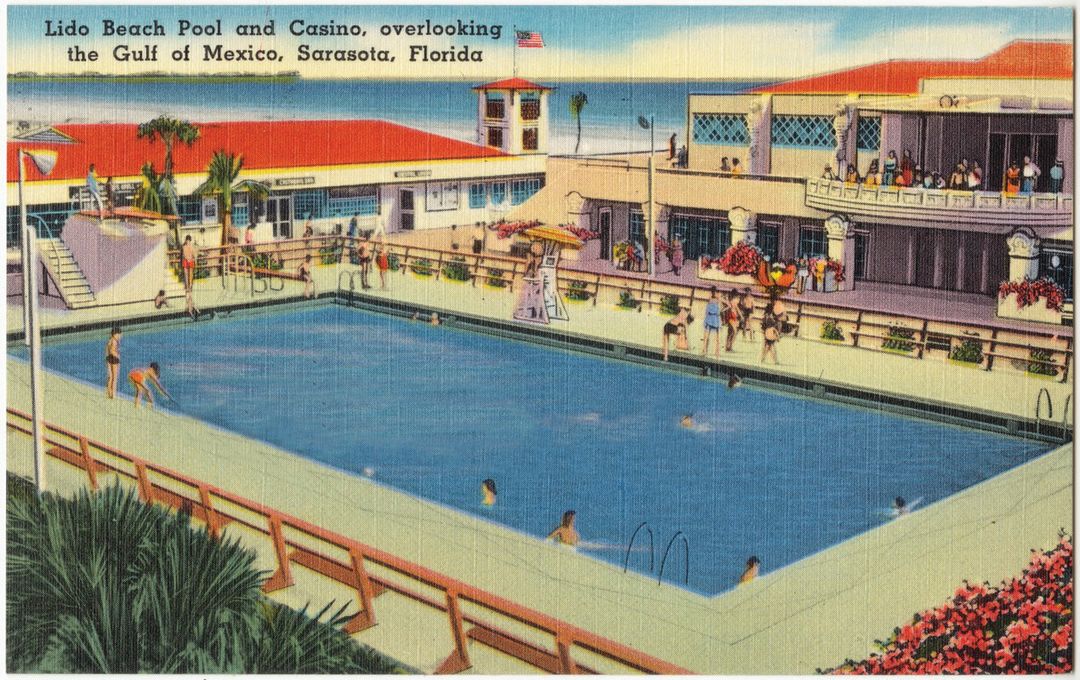From the Editor: A Lost Chance at Lido

A vintage postcard of the old Lido Casino.
"Should the city of Sarasota partner with a business to add a 200-seat restaurant and tiki bar to Lido Beach?” We asked our 28,000 Facebook fans that a few months ago, and their overwhelming reaction was summed up in one comment: “No, no, no, no, just plain no!” Lido needed to “stay humble,” our fans said, to resist our city’s “unrelenting development” and remain “a laid-back, Old Florida beach experience.”
I wondered how a project that sparks such loathing got started. It turns out that in 2012, after being slammed by the recession, the city decided it couldn’t afford to keep the Lido pool open. A group of Lido Key residents spearheaded a committee to figure out how to save the pool and presented a plan for repairs and revenue-generating improvements, including a splash pool and “enhanced food service,” for a cost of $2.9 million.
The city had only $1.2 million set aside for the project, so they decided to seek a public-private partnership. In 2015, Daiquiri Deck owners Troy Syprett and Gavin Meshad responded to the invitation to negotiate a lease. Plans developed over the next few years, and on Nov. 30, the commission voted 3 to 2 to approve the lease. The developers will spend about $4 million on repairs and improvements, including that 200-seat restaurant.
I went out to Lido on a balmy December morning to enjoy one of the concession stand’s legendary $13 lobster rolls and check out the site. The picnic area is the location of the future restaurant, which is really just an outdoor dining area that will be covered by a big canvas shade. A walk-up window will also serve beach-goers (and yes, the lobster roll will remain on the menu, promises developer Syprett.) The pavilion has tranquil, old-Florida charm, but it’s shabby, too, and it’s hard to see a low-key dining area with beautiful beach views as anything but an improvement.
Some opponents say the developers are getting “a sweetheart deal.” In addition to improving and operating the entire property, they’ll pay the city 3.5 percent of their annual revenues, which they estimate will be around $4 million. They can renew the lease without further negotiations every 10 years for the next 30 years. Commissioner Jennifer Ahearn-Koch is among the critics. “If this were a better deal for the city, I would have been a lot less sure when I voted no,” she says. On the other hand, one prominent local restaurateur told me the deal seemed fair to him.
Parking is also an issue for Ahearn-Koch—and many others. There are 308 parking spaces at Lido Beach, and they already fill up quickly. Yet the operators don’t have to provide any additional spaces. According to a city spokesman, the restaurant will draw people already at the beach and “won’t be a destination.” Ahearn scoffs at that idea: “The operators know what they are doing and it [the restaurant] is on the beach. It is going to be a destination.”
Commissioner Liz Alpert, who voted for the project, says the decision was “extremely difficult.” But when she explained to opponents that the project won’t include any new buildings and “will have the same look and feel as what’s already there,” many changed their minds. “And when public-private partnership can save taxpayers money, that’s good,” she says.
Despite the parking issues, I don’t think this project will ruin Lido Beach, and I can imagine my family enjoying everything from the new poolside cabanas to a sunset drink at the tiki bar. But something bothers me about giving a business—however well-run—control of our city’s only public beach for 30 years. When I looked back at our Facebook post, I saw former county administrator John Wesley White had called the project “small thinking” and asked why the city didn’t instead try to create something as iconic as the late, great Lido Casino, a public-owned facility that was a beloved center of civic life.
I called him and asked what he meant. “The city could have reached higher,” he said—even if it did mean spending public money. “The pressure is always there not to raise taxes. But sometimes spending is an investment.” White wishes the city had launched a communitywide visioning process to build support for a facility that would have defined and enhanced our character. “Instead we’ve ended up with “a business transaction,” he said. The more I think about that, the more I agree with White’s final assessment: “It’s not bad, but it was a missed opportunity.”



